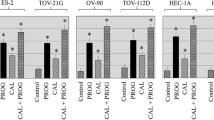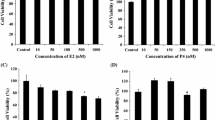Abstract
Several reports suggested that steroidogenic hormones could be directly involved in the regulation of apoptosis in vitro, but whether this is due to blocking or promoting mechanism of these hormones remains controversial. However, it was shown that progesterone exhibited a protective effect against the apoptotic process during mouse mammary gland involution in vivo. In this study, we analyzed the effect of medroxyprogesterone acetate (MPA) treatment, an agonist of progesterone, on serum starvation induced apoptosis on breast cancer cell lines. Positive and negative progesterone receptor (PgR+ and PgR−) breast cancer cell lines were treated with MPA (10nM), either in standard culture conditions or in serum-free medium to induce apoptosis. Cell survival, proliferation and apoptosis were simultaneously analyzed with the expression of apoptosis-related genes measured by a real time quantitative RT-PCR. At non cytotoxic doses, MPA protected PgR+ T47-D, MCF-7 and H466-B cell lines against serum depletion-induced apoptosis, while MPA did not protect PgR-MDA-MB-231 cells against serum depletion induced apoptosis. In PgR+ cell lines and in concordance with the protective effect, the pro-apoptotic HRK and BAK1 mRNAs were up-regulated after apoptosis induction, while they were no more induced in condition of protection against apoptosis after MPA treatment. We also observed, specifically in PgR+ cells, an up-regulation of BCLX-L and BCLX-S and a down-regulation of BCL2 mRNAs, which are specific to the MPA response and unrelated to apoptotic process. Involvement of these genes with regard to the MPA-mediated protection against apoptosis is discussed.
Similar content being viewed by others
References
Gross A, McDonnell JM, Korsmeyer SJ: BCL-2 family members and the mitochondria in apoptosis. Genes Dev 13: 1899-1911, 1999
Antonsson B, Martinou JC: The Bcl-2 protein family. Exp Cell Res 256: 50-57, 2000
Nicholson DW: Caspase structure, proteolytic substrates, and function during apoptotic cell death. Cell Death Differ 6: 1028-1042, 1999
Jacotot E, Costantini P, Laboureau E, Zamzami N, Susin SA, Kroemer G: Mitochondrial membrane permeabilization during the apoptotic process. Ann N Y Acad Sci 887: 18-30, 1999
Loeffler M, Kroemer G: The mitochondrion in cell death control: certainties and incognita. Exp Cell Res 256: 19-26, 2000
Kumar S: Mechanisms mediating caspase activation in cell death. Cell Death Differ 6: 1060-1066, 1999
Slee EA, Adrain C, Martin SJ: Serial killers: ordering caspase activation events in apoptosis. Cell Death Differ 6: 1067-1074, 1999
Kiess W, Gallaher B: Hormonal control of programmed cell death/apoptosis. Eur J Endocrinol 138: 482-491, 1998
Furth PA: Introduction: mammary gland involution and apoptosis of mammary epithelial cells. J Mammary Gland Biol Neoplasia 4: 123-127, 1999
Bissell MJ, Weaver VM, Lelievre SA, Wang F, Petersen OW, Schmeichel KL: Tissue structure, nuclear organization, and gene expression in normal and malignant breast. Cancer Res 59: 1757s-1763s; discussion 1763s-1764s, 1999
Ferguson DJ, Anderson TJ: Morphological evaluation of cell turnover in relation to the menstrual cycle in the ‘resting’ human breast. Br J Cancer 44: 177-181, 1981
Graham JD, Clarke CL: Physiological action of progesterone in target tissues. Endocr Rev 18: 502-519, 1997
Feng Z, Marti A, Jehn B, Altermatt HJ, Chicaiza G, Jaggi R: Glucocorticoid and progesterone inhibit involution and programmed cell death in the mouse mammary gland. J Cell Biol 131: 1095-1103, 1995
Kandouz M, Siromachkova M, Jacob D, Chretien Marquet B, Therwath A, Gompel A: Antagonism between estradiol and progestin on Bcl-2 expression in breast-cancer cells. Int J Cancer 68: 120-125, 1996
Formby B, Wiley TS: Progesterone inhibits growth and induces apoptosis in breast cancer cells: inverse effects on Bcl-2 and p53. Ann Clin Lab Sci 28: 360-369, 1998
Kandouz M, Lombet A, Perrot JY, Jacob D, Carvajal S, Kazem A, Rostene W, Therwath A, Gompel A: Proapoptotic effects of antiestrogens, progestins and androgen in breast cancer cells. J Steroid Biochem Mol Biol 69: 463-471, 1999
Formby B, Wiley TS: Bcl-2, surviv in and variant CD44 v7-v10 are downregulated and p53 is upregulated in breast cancer cells by progesterone: inhibition of cell growth and induction of apoptosis. Mol Cell Biochem 202: 53-61, 1999
Bardon S, Vignon F, Montcourrier P, Rochefort H: Steroid receptor-mediated cytotoxicity of an antiestrogen and an antiprogestin in breast cancer cells. Cancer Res 47: 1441-1448, 1987
Metcalfe AD, Gilmore A, Klinowska T, Oliver J, Valentijn AJ, Brown R, Ross A, MacGregor G, Hickman JA, Streuli CH: Developmental regulation of Bcl-2 family protein expression in the involuting mammary gland. J Cell Sci 112: 1771-1783, 1999
Schorr K, Li M, Krajewski S, Reed JC, Furth PA: Bcl-2 gene family and related proteins in mammary gland involution and breast cancer. J Mammary Gland Biol Neoplasia 4: 153-164, 1999
Heermeier K, Benedict M, Li M, Furth P, Nunez G, Hennighausen L: Bax and Bcl-xs are induced at the onset of apoptosis in involuting mammary epithelial cells. Mech Dev 56: 197-207, 1996
Sabourin JC, Martin A, Baruch J, Truc JB, Gompel A, Poitout P: bcl-2 expression in normal breast tissue during the menstrual cycle. Int J Cancer 59: 1-6, 1994
Zapata JM, Krajewska M, Krajewski S, Huang RP, Takayama S, Wang HG, Adamson E, Reed JC: Expression of multiple apoptosis-regulatory genes in human breast cancer cell lines and primary tumors. Breast Cancer Res Treat 47: 129-140, 1998
Wilding G, Lippman ME, Gelmann EP: Effects of steroid hormones and peptide growth factors on proto-oncogene c-fos expression in human breast cancer cells. Cancer Res 48: 802-805, 1988
O'Connor PM, Jackman J, Bae I, Myers TG, Fan S, Mutoh M, Scudiero DA, Monks A, Sausville EA, Weinstein JN, Friend S, Fornace AJ, Jr., Kohn KW: Characterization of the p53 tumor suppressor pathway in cell lines of the National Cancer Institute anticancer drug screen and correlations with the growth-inhibitory potency of 123 anticancer agents. Cancer Res 57: 4285-4300, 1997
Li M, Hu J, Heermeier K, Hennighausen L, Furth PA: Apoptosis and remodeling of mammary gland tissue during involution proceeds through p53-independent pathways. Cell Growth Differ 7: 13-20, 1996
Gompel A, Sabourin JC, Martin A, Yaneva H, Audouin J, Decroix Y, Poitout P: Bcl-2 expression in normal endometrium during the menstrual cycle. Am J Pathol 144: 1195-1202, 1994
Dong L, Wang W, Wang F, Stoner M, Reed JC, Harigai M, Samudio I, Kladde MP, Vyhlidal C, Safe S: Mechanisms of transcriptional activation of bcl-2 gene expression by 17betaestradiol in breast cancer cells. J Biol Chem 274: 32099-32107, 1999
Perillo B, Sasso A, Abbondanza C, Palumbo G: 17beta-estradiol inhibits apoptosis in MCF-7 cells, inducing bcl-2 expression via two estrogen-responsive elements present in the coding sequence. Mol Cell Biol 20: 2890-2901, 2000
Young RL, Korsmeyer SJ: A negative regulatory element in the bcl-2 5'-untranslated region inhibits expression from an upstream promoter. Mol Cell Biol 13: 3686-3697, 1993
Miyashita T, Harigai M, Hanada M, Reed JC: Identification of a p53-dependent negative response element in the bcl-2 gene. Cancer Res 54: 3131-3135, 1994
Schiavone N, Rosini P, Quattrone A, Donnini M, Lapucci A, Citti L, Bevilacqua A, Nicolin A, Capaccioli S: A conserved AU-rich element in the 3’ untranslated region of bcl-2 mRNA is endowed with a destabilizing function that is involved in bcl-2 down-regulation during apoptosis. Faseb J 14: 174-184, 2000
Leung LK, Wang TT: Paradoxical regulation of Bcl-2 family proteins by 17beta-oestradiol in human breast cancer cells MCF-7. Br J Cancer 81: 387-392, 1999
Takayama S, Krajewski S, Krajewska M, Kitada S, Zapata JM, Kochel K, Knee D, Scudiero D, Tudor G, Miller GJ, Miyashita T, Yamada M, Reed JC: Expression and location of Hsp70/Hsc-binding anti-apoptotic protein BAG-1 and its variants in normal tissues and tumor cell lines. Cancer Res 58: 3116-3131, 1998
Wang HG, Rapp UR, Reed JC: Bcl-2 targets the protein kinase Raf-1 to mitochondria. Cell 87: 629-638, 1996
Wang HG, Takayama S, Rapp UR, Reed JC: Bcl-2 interacting protein, BAG-1, binds to and activates the kinase Raf-1. Proc Natl Acad Sci USA 93: 7063-7068, 1996
Zeiner M, Gehring U: A protein that interacts with members of the nuclear hormone receptor family: identification and cDNA cloning. Proc Natl Acad Sci USA 92: 11465-11469, 1995
Kullmann M, Schneikert J, Moll J, Heck S, Zeiner M, Gehring U, Cato AC: RAP46 is a negative regulator of glucocorticoid receptor action and hormone-induced apoptosis. J Biol Chem 273: 14620-14625, 1998
Froesch BA, Takayama S, Reed JC: BAG-1L protein enhances androgen receptor function. J Biol Chem 273: 11660-11666, 1998
Ricoul M, Lebeau J, Sabatier L, Dutrillaux B: Increased radiation-induced chromosome breakage after progesterone addition at the G1/S-phase transition. Mutat Res 403: 177-183, 1998
Author information
Authors and Affiliations
Rights and permissions
About this article
Cite this article
Ory, K., Lebeau, J., Levalois, C. et al. Apoptosis inhibition mediated by medroxyprogesterone acetate treatment of breast cancer cell lines. Breast Cancer Res Treat 68, 187–198 (2001). https://doi.org/10.1023/A:1012288510743
Issue Date:
DOI: https://doi.org/10.1023/A:1012288510743




